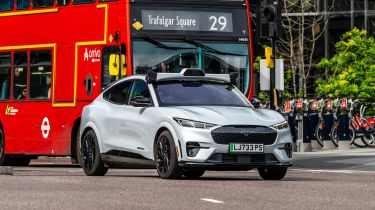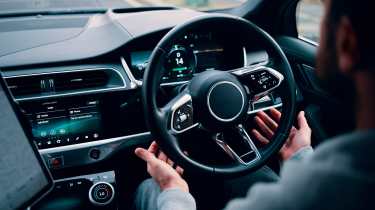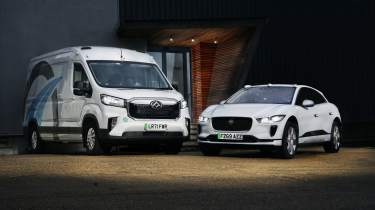Hello Wayve! The UK firm at the forefront of AI autonomous car tech
UK firm Wayve is integrating artificial intelligence into its autonomous vehicle software to help make the technology smarter and safer
The concept of self-driving cars is a subject that everyone seems to have an opinion on, despite the reality that so few of us have actually experienced the technology. As an Auto Express reader, for example, there’s a fair chance that you love cars and enjoy driving, in which case you might well consider autonomous capability a fun-sapping, pointless exercise.
Or maybe you’re one of those people who find the idea of our roads being populated by automated machines a little disturbing. If so, you’re not alone – an American Automobile Association poll published in March this year revealed that 66 per cent of respondents feared autonomous vehicles (AVs). Or perhaps, after seemingly years of extravagant promises and missed deadlines from some of the car industry’s more colourful figures – plus a growing number of manufacturers re-evaluating or pulling back from their self-driving programmes – you’re simply sceptical that the technology will ever see the light of day in any meaningful fashion. If you’re in the latter camp, two recent events may cause you to pause and rethink.
Firstly, on 20 May, the Automated Vehicles Act became law in the United Kingdom. Hailed as the most comprehensive legal framework of its kind in the world, the news was accompanied by some headline-grabbing comments from then-Transport Secretary Mark Harper, who said: “Our landmark legislation means self-driving vehicles can be rolled out on British roads as soon as 2026.”
Earlier that same month, there had been another announcement that may have dramatic implications for automated vehicles, both in the UK and further afield. Wayve, a London-based company developing artificial intelligence (AI) for self-driving cars, confirmed a mammoth Series C funding round of $1.05billion (broadly £840million) – the largest investment in an AI company that Europe has seen to date.
Investors included respected names such as Microsoft, US chip maker Nvidia and Japan’s SoftBank, and the huge sum caused more than a few ripples in the AV world, where funding has become increasingly difficult to find in the past couple of years. It was a dramatic rise to prominence for Wayve. But who is it, and what does it do?
Founded in 2017 by a Cambridge University graduate, Alex Kendall, Wayve is a software company that’s based in an unremarkable area of the capital just north of King’s Cross, near the Caledonian Road.
Its vision is perhaps best explained by Kendall via a blog post on the company’s website, in which he explains: “Since our inception, we have held a core belief that end-to-end AI will make autonomy possible. This has been a deeply contrarian approach against the rest of the market.”
The manifestation of this vision is what Wayve calls end-to-end Embodied AI. In a chat with Auto Express, Wayve president Erez Dagan explains how it works.
He tells us: “Contrary to existing approaches [that are used by autonomous cars] of perceiving the environment – which build an understanding of what goes on around [a vehicle] in full description and then build another decision layer that tries to navigate through that environment - end-to-end AI builds a single network that sees the input sources from the [car’s] sensors and yields the output actions to drive very naturalistic, safe and fluent driving behaviour.”
Essentially, Wayve’s approach – which the company describes as AV2.0 – is to develop software that teaches computers how to drive in the same way that humans are taught, by observing real-life scenarios and learning on the job. This allows it to have the on-board intelligence to understand its environment without a set map, and automatically deal with complexities in the way it has seen human drivers do – such as slowing when approaching a speed bump, or determining who has the right of way on a narrow road when a bus is approaching.
It’s not an easy concept for the average driver to get their head around, but it differs significantly from AV1.0, as Dagan calls it, where an AV’s behaviour, or what it’s able to detect, has to be pre-determined or defined.
“Do we want to dictate what the system should perceive?” he continued. With the AV1.0 approach, he argues, “You are creating the risks of information bottlenecks, meaning that you won’t be taking into account all of the complexities that the environment could present you with.”
In contrast, AV2.0 allows the AI “to decide what the most valuable insights from the sensor stream are to be able to drive the car”. This, he claims, brings tangible benefits, including speed of development and, more importantly, safety.
Dagan continues: “The question of safety lies on the long tail of rare events [extremely unusual scenarios that an autonomous car might be exposed to]. Something inherent to the way that we approach the problem is that we are unsupervised learning, just like [conversational software] ChatGPT runs through the Internet, reads the Internet and gets smart.
“We only need to see videos that were recorded while human drivers were driving the car, so we get exposed to hundreds of thousands of driving hours rather effortlessly, increasing our exposure to that long tail of scenarios and building the right representations to deal with them.
“Other approaches are much more constrained because they are supervised learning. It creates a lot of overheads, so they are bound in terms of how much information the machine learning tool is exposed to and what the plausibility is of encountering true long-tail events.”
While Wayve’s outlook is unquestionably innovative, it’s worth pointing out that it’s not some maverick enterprise promoting tech that isn’t viable in the real world. This was emphatically illustrated, for example, by its selection by the UK Government, in tandem with technology research group WMG at the University of Warwick, to lead into the deployment of AI in self-driving vehicles as part of the DriveSafeAI project. Wayve was also regularly consulted in the run-up to the formalising of the Automated Vehicles Act, which as mentioned previously was introduced alongside claims that self-driving cars could be on our roads within two years.
So can we expect to see any Wayve solutions on the market by 2026? The company is staying very tight-lipped on timelines, but what is clear from its likely product offering is that the technology could be swiftly integrated into a host of different vehicles and platforms fitted with the right hardware.
Among the key features of AV2.0 are compatibility with various vehicle sensors (from cameras only to radar and Lidar), scalability through data-driven generation, a lack of requirement for high-definition mapping and – compared with the costly AV1.0 approach of the autonomous robotaxis that we have seen in the US – relative affordability.
As Kendall pointed out on Wayve’s blog: “This approach leverages software-defined vehicles to integrate Embodied AI into existing ADAS [advanced driver-assistance systems] to generate revenue, collect data and build consumer trust.
“This paves the way to train and validate full autonomy with data from a global install base — incrementally growing ‘eyes off’ driving capabilities by delivering over-the-air updates to vehicles to upgrade their driving automation levels and facilitate the transition to a driverless future.”
And this, in a nutshell, constitutes Wayve’s road map. Although the company is yet to confirm any partnerships with vehicle manufacturers, it has tested its tech in a diverse array of cars and vans from the likes of Jaguar, Ford and SAIC Maxus. Wayve is confident that its agnostic nature will be a big benefit when it comes to sales.
Dagan adds: “Being ‘software only’ gives the OEMs a lot of flexibility when it comes to when, how and based on what evidence they can flush our solution to their vehicles. That will be one of the key generators of traction. We are working with multiple car makers across the globe and there will be some news to come.”
For the time being, some of the recent massive investment is being used to expand Wayve’s on-road testing programme, which is being “ramped up” outside London and the UK, with the United States being the immediate focus and Europe poised to follow.
Of course, despite the undoubted cleverness of its tech, one thing that Wayve – and indeed anyone operating in the AV space – has to conquer is general scepticism about self-driving vehicles in general.
Although most people are aware of the mooted benefits – such as improved safety by eliminating human error, greater independence for non-drivers, the potential to address labour shortages, etc – not everyone is convinced by the idea, and concern has been exacerbated by some alarming headlines from the US of late plus the slow rate of progress from car makers.
Dagan remains confident, though, that Wayve can help to change perceptions. “Well, we are doing things in a radically different way to the existing solutions,” he concludes. “The industry has been struggling and Wayve has taken a very firm position on the right technological bet.
“I’ve witnessed the industry going through a lot of cycles in the past 20 years, and what has happened in the last two or three in the space of AI is a transformational enabler of the future.”
Safety concerns: Why self-driving tech has been under scrutiny
Wayve’s rise to prominence has come at a time when self-driving tech is under the microscope like never before, particularly in the United States, where there has been a swathe of negative headlines following some high-profile incidents involving so-called AV1.0 ‘robotaxis’.
At the centre of the biggest storm has been General Motors’ subsidiary Cruise. Its driverless robotaxi service – which saw Chevrolet Bolts retrofitted with autonomous systems operating in specific geofenced areas – was expanding into a number of US cities, before an accident in San Francisco last October put the brakes on.
The incident saw a pedestrian seriously injured after being dragged along the road for 20 feet by one of Cruise’s autonomous taxis, having originally being struck by a human-driven car. The company subsequently had its licences to operate in California removed as an unreasonable risk to public safety, then voluntarily paused all activities nationally.
In the fallout, GM cut annual funding by $1billion (£800m), hundreds of jobs were axed, senior staff were sacked, and only now is Cruise returning to the road, testing tentatively in Phoenix and Dallas, with humans on board overseeing things.
The result has been a heightened level of scrutiny for other operators from the media, the public and federal agencies. At the time of writing, Waymo – which runs converted Jaguar I-Paces – and Amazon-owned Zoox, which has retrofitted Toyota Highlander SUVs, are being investigated by the National Highway Traffic Safety Administration amid safety concerns.
The wider industry: What are the car makers doing?
A decade ago, and there was plenty of hype from the world’s car makers over fully autonomous, self-driving cars. But as the years have passed, the reality of the time and expense required to develop them has caused a reality check for some.
In May, Renault Group said it would only focus on autonomous solutions in public transport. “Complete vehicle autonomy seems unlikely for the time being, given current regulations, customer expectations and the cost of the technology involved,” it said in a statement.
It sounded eerily similar to Ford’s justification when it pulled out of autonomous-tech company Argo AI in 2022. It said: “The auto industry’s large-scale profitable commercialisation of Level 4 [fully driverless] systems will be further out than originally anticipated.
“Profitable, fully autonomous vehicles at scale are a long way off and we won’t necessarily have to create that technology ourselves.”
Regulatory approval is another hurdle. The most advanced tech currently available is Mercedes’ Level 3 Drive Pilot, which is on offer on selected models in Germany and the states of Nevada and California, and allows limited hands-off, eyes-off driving.
There’s a sense that Wayve’s reliance on end-to-end AI, and its benefits in terms of speed of development, cost and safety, could prove attractive. At least one car maker is following a similar approach: Tesla. The latest iteration of its Full Self Driving software uses end-to-end AI.
As Alex Kendall told Bloomberg in April: “We’ve been all in on end-to-end AI since we started in 2017. It’s nice to see Tesla join the club.”
Would you get into a self-driving car? Let us know in the comments...
Find a car with the experts







